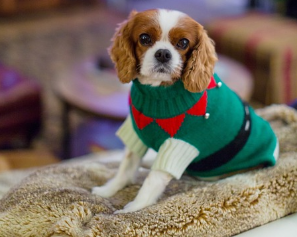
When winter arrives, the chill in the air can be both refreshing and challenging for humans and their furry companions alike. While some regions experience mild winters, others face biting cold temperatures. Dogs, just like us, are affected by these seasonal changes, and it’s up to us to ensure their comfort and health. This guide is tailored to pet parents, focusing on the unique challenges and solutions for keeping your dog safe, warm, and happy during the colder months.
Keep Them Warm and Cozy
How to Spot if Your Dog is Cold
Dogs exhibit signs like shivering, curling up tightly, or seeking warm corners when they’re cold. Some breeds, like Huskies and Saint Bernards, are naturally equipped for the cold, but smaller or short-haired breeds, like Beagles or Dachshunds, need additional warmth.
What You Can Do
- Provide Warm Bedding: Invest in a thick, cozy bed with blankets for your dog. Consider heated pet beds if your region gets extremely cold.
- Use Dog Sweaters or Jackets: Choose comfortable sweaters or jackets for your dog, especially during morning walks. Make sure they’re well-fitted but not too tight.
- Keep Them Indoors: Avoid letting your dog sleep outside or on cold floors.
Dogs burn more calories in winter to maintain their body heat. Adjust their diet to keep them energized while avoiding overfeeding.

What to Feed
- Protein-Rich Diet: Include high-quality protein sources like chicken, eggs, or fish to support their energy needs.
- Healthy Fats: Add fish oil or omega-3 supplements to promote a shiny coat and combat dry skin.
- Warm Meals: Serve food at room temperature or slightly warm to make it more appealing during cold days.
1. Add Seasonal Vegetables
Incorporate dog-safe vegetables that are rich in vitamins and minerals:
- Carrots: High in beta-carotene, carrots promote healthy vision and immune function.
- Pumpkin: A great source of fiber and Vitamin A, it supports digestion and overall health.
- Sweet Potatoes: Packed with nutrients like Vitamin C and potassium, they are an excellent winter treat.
- Green Beans: Low-calorie and full of fiber, green beans are a great addition to meals.
2. Boost Antioxidants
Antioxidants help strengthen your dog’s immune system to fight off winter illnesses. Include foods like:
- Blueberries (in moderation): Rich in antioxidants and Vitamin C.
- Spinach: A source of iron and Vitamin E, but feed sparingly to avoid digestive issues.
3. Include Whole Grains
If your dog’s diet includes grains, add whole grains to provide energy and warmth:
- Brown Rice: Provides energy and is easy to digest.
- Oats: A healthy option that also aids in digestion.
4. Hydrating Soups and Broths
Warm, homemade soups or broths (without salt, onion, or garlic) can be comforting and hydrating. Consider:
- Chicken or Bone Broth: Provides collagen and is soothing during cold weather.
- Vegetable Broth: A nutritious, low-calorie option to mix with their meals.
5. Increase Fiber Intake
Fiber aids digestion, especially during winter when dogs might be less active. Include foods like:
- Cooked Beetroot: Good for digestion and adds a natural sweetness.
- Apples (without seeds): A crunchy, fiber-rich snack.
6. Add Dairy in Moderation
- Plain Yogurt: Rich in probiotics, it supports gut health.
- Paneer (Cottage Cheese): A mild, protein-rich treat.
7. Strengthen Bones and Joints
Winter can exacerbate joint problems in some dogs. Include foods that promote joint health:
- Glucosamine-Rich Foods: Bone broth and chicken feet naturally provide glucosamine.
- Chia or Flaxseeds: These are plant-based sources of omega-3 for joint support.
8. Herbal Enhancements
Certain herbs can improve health and immunity:
- Turmeric: Contains curcumin, which has anti-inflammatory and immune-boosting properties. Sprinkle a small amount on their food.
- Parsley: Helps freshen breath and is rich in Vitamin C and A.
9. High-Calorie Treats (for Active Dogs)
If your dog is very active during winter, occasional high-calorie snacks can help:
- Peanut Butter (Unsalted): A tasty energy booster (ensure it’s xylitol-free).
- Boiled Eggs: Provide healthy fats and proteins for sustained energy.
10. Supplements for Winter Needs
- Multivitamins: If your vet recommends, use dog-specific multivitamins to cover any nutritional gaps.
- Probiotics: To support gut health and immunity.
Protect Their Paws
Winter can be harsh on your dog’s paws, especially if they walk on cold or wet surfaces.
How to Care for Paws
- Moisturize: Apply pet-safe paw balm to prevent cracking.
- Clean After Walks: Check for dirt, salt, or debris stuck between their paw pads. Wash with lukewarm water and pat dry.
- Use Booties: If your dog is comfortable, use dog booties for extra protection.
Keep Their Skin and Coat Healthy
Dry winter air can lead to flaky skin and a dull coat. Regular grooming is essential to maintain their skin health.
Tips for Grooming in Winter
- Brush Regularly: Brushing helps distribute natural oils, preventing dryness.
- Avoid Over-Bathing: Too many baths can strip natural oils. Use a mild, moisturizing shampoo if a bath is necessary.
- Use a Humidifier: If the air in your home is very dry, a humidifier can help keep your dog’s skin hydrated.
Exercise but Be Cautious
While it’s tempting to skip walks in cold weather, regular exercise is crucial for your dog’s physical and mental health.
What to Keep in Mind
- Shorter Walks: Opt for shorter, more frequent walks to avoid prolonged exposure to the cold.
- Timing is Key: Walk your dog during warmer parts of the day, like mid-morning or early afternoon.
- Keep Them Dry: Dry your dog immediately after walks if they get wet from dew or frost.
Engage in Indoor Activities
- Play Interactive Games: Tug-of-war, hide-and-seek, and fetch are great for burning off energy indoors.
- Teach New Tricks: Use the extra indoor time to teach commands or refine their obedience skills.
- DIY Agility Courses: Set up obstacles like cushions, chairs, and tunnels for a fun indoor challenge.
Watch for Winter Health Issues
Common Winter Problems
- Hypothermia: Symptoms include shivering, lethargy, and weakness. Wrap your dog in a warm blanket and consult a vet immediately.
- Arthritis: Older dogs may experience worsened joint pain during winter. Provide a soft bed and consult your vet about supplements.
- Dry Nose: Use a pet-safe balm to keep their nose moisturized.
Hydration is Key
Dogs can become dehydrated even in winter. Ensure they have access to fresh, clean water at all times. You can also add a little warm water to their meals to encourage hydration.
Avoid Overheating
Extra Tips for Pet Parents
- Winter-Specific Toys: Provide interactive toys to keep your dog entertained indoors.
- Vet Check-Up: Schedule a winter health check-up to ensure your dog is in perfect shape for the season.
- Monitor Behavior: Keep an eye on your dog’s behavior for any signs of discomfort or illness.
Wao Thanks for providing informative blog
ReplyDelete